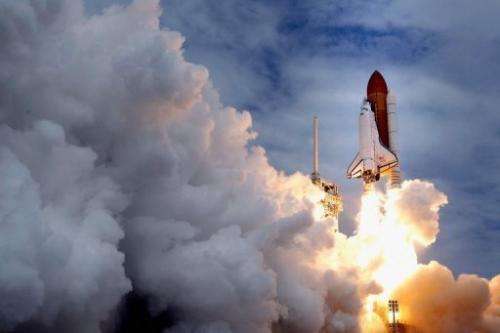Atlantis docks at space station for last time

The shuttle Atlantis docked at the orbiting International Space Station for one last hitch-up Sunday, on its final space voyage before the entire 30-year US shuttle program shuts down for good.
The shuttle docked at 11:07 am (1507 GMT), just over an hour after the spacecraft performed its habitual slow backflip so that the ISS crew could take pictures of Atlantis's heat shield before clasping onto the lab, NASA said.
Hatches opened between the two spacecraft at 12:47 pm (1647 GMT), and the four Atlantis astronauts floated across to greet their ISS crewmates with hugs and smiles.
Shortly afterward, NASA said it was tracking a piece of space debris that could be on a path to collide with the ISS by Tuesday, the day that two US astronauts are scheduled to step out on a spacewalk.
"What we were told today is very preliminary," said deputy manager of the space shuttle program LeRoy Cain. "It is a potential right now."
Atlantis began its 12-day journey on Friday with a picture-perfect liftoff from Kennedy Space Center that was watched locally by hundreds of thousands of tourists, and marked the last-ever blastoff of the three decade long program.
The flight marks the end of an era for NASA, leaving Americans with no actively operating government-run human spaceflight program and no method for sending astronauts to space until private industry comes up with a new capsule, likely by 2015 at the earliest.
With the shuttle gone, only Russia's three-seat Soyuz capsules will be capable of carrying astronauts to the ISS at a cost of more than $50 million per seat.
Asked on CNN Sunday about headlines that proclaim the start of a period of Russian dominance in spaceflight, the US space agency's administrator Charles Bolden said: "I don't think I could disagree more with the headlines."
"We have been the leader for many years, many decades now, and that will -- we will maintain that leadership," said the former astronaut.
Atlantis is carrying 8,000 pounds (3,000 kilograms) of supplies, which the combined crew of 10 -- four aboard the shuttle's STS-135 mission and six aboard the ISS as part of Expedition 28 -- will transfer during the mission.
A failed ammonia pump will then be transferred to the shuttle payload bay for return to Earth.
Monday will be occupied with setting up the transfer of the Raffaello multipurpose module, which holds the extra supplies, from the shuttle to the Earth-facing side of the station's Harmony module.
A spacewalk by American ISS crew members Garan and Mike Fossum is set for Tuesday.
The duo has already stepped out together on three spacewalks in June 2008 as part of the STS-124 mission that delivered the Japanese Kibo lab to the ISS.
"Poetry in motion," said a commentator at mission control in Houston after the shuttle began its nine-minute somersault ahead of approach, also known as the rendezvous pitch maneuver.
The one-degree-per-second backflip was a key maneuver in Atlantis's approach to the lab, allowing ISS crew members already at the station to take photos of the shuttle's exterior and check if any damage was incurred during the takeoff.
The approach and latch-on were "flawless," said mission control.
Three ISS crew, including Japanese flight engineer Satoshi Furukawa, snapped high-resolution photos of the shuttle as it circled in toward the orbiting lab.
On Saturday, the Atlantis crew performed the first inspection of the craft's thermal protection system, the outer barrier that protects it from the searing heat upon re-entry into the Earth's atmosphere.
Careful inspections of the shuttle body have become a primary activity since the space shuttle Columbia was destroyed upon re-entry into the Earth's atmosphere in 2003.
A panel of experts concluded that a heat shield tile on the craft's wing was damaged at blast-off, fatally compromising the craft's re-entry protection and killing all seven crew on board.
The shuttle's return to Earth is currently scheduled for July 20, though NASA may add an extra day to the mission.
After that, NASA will continue working with private industry on plans to build a next generation spacecraft to tote astronauts and cargo to the ISS, while NASA focuses on a multipurpose crew vehicle that could take astronauts to deep space, Bolden said.
"The president has set the goals: an asteroid in 2025, Mars in 2030. I can't get any more definitive than that," he said.
(c) 2011 AFP


















